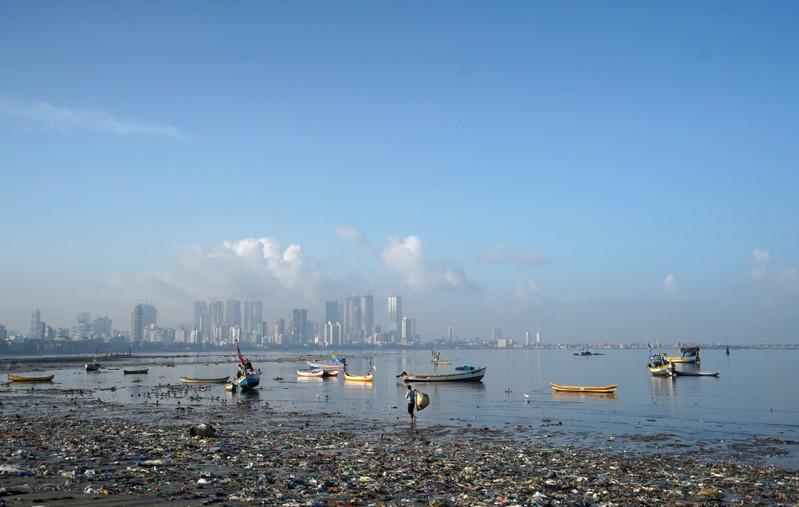Global Stocktake Highlights Urgent Need For Inclusive Policymaking
Sep 10, 2023 | Pratirodh Bureau
FILE PHOTO: A ragpicker collects recyclable material from a garbage-strewn beach in Mumbai
The adoption of the Paris Agreement in 2015 by 196 countries represented the most ambitious statement of intent ever made at the global level to combat the climate crisis. A key element of the Paris Agreement is the Global Stocktake – a process which evaluates progress made towards climate targets.
Released on 8 September 2023, the report of the first Global Stocktake lists 17 key findings, across chapters on (i) context; (ii) mitigation, including response measures; (iii) adaptation, including loss and damage; and (iv) means of implementation and support and finance flows. Many of these key findings are not surprising, especially key finding 4, which states bluntly: “Global emissions are not in line with modelled global mitigation pathways consistent with the temperature goal of the Paris Agreement.”
This was already well known. The 2023 synthesis report by the Intergovernmental Panel on Climate Change – a collective of climate scientists from around the world – estimated that even if implemented, current pledges for climate action would result in a global temperature increase of 2.8 degrees Celsius by 2100. This is far above the Paris Agreement temperature goal limiting temperature rise to well below 2C above pre-Industrial Age levels.
The Paris Agreement, though, was based on the idea that national climate pledges – known as nationally determined contributions (NDCs) – would become more ambitious with time. In a so-called ‘ratchet mechanism’, countries are supposed to update their climate pledges every five years, thereby driving more rapid collective action. In this context, the Global Stocktake, in the words of executive secretary of the UN Framework Convention on Climate Change Simon Stiell, tells us “where we are, where we need to go, and how we’ll get there.”
The “where we are”, though problematic, is clear. But getting to where we need to go – drastically lower carbon emissions – is politically contentious. And while most of the key findings of the Global Stocktake are expressed in fairly bland language, there are at least three major points that will be particularly uncomfortable for governments in developing and developed countries to hear.
Going Beyond States
The parties to the Paris Agreement are nation states, but it has become increasingly clear that states tend to be limited in their ambitions, and exclude important populations such as women and indigenous groups. Key finding 2 in the Global Stocktake report speaks directly to this, stating that “actions by non-party stakeholders” are essential for a wholesale transformation of systems.
The Global Stocktake emphasises that successful responses to the challenges of climate change depend on “whole-of-society approaches and integrated, inclusive policymaking”. Egypt, as the host of last year’s climate summit COP27, was severely criticised for its harassment of civil society actors. The United Arab Emirates, the host of this year’s COP28 has also been called out for sidelining civil society. As such, the prominence this finding is given in the Global Stocktake report is striking.
More than 1,000 documents were submitted for the Global Stocktake report, running into tens of thousands of pages of information overall. These were submitted by governments as well as “137 non-party stakeholders [who] have submitted information on their actions to support the goals of the Paris Agreement.” Nonetheless, the Global Stocktake does not take civil society actors at face value, and recommends transparency as key to their credibility.
A Faster Pathway To Net Zero, More Public Finance
In its key finding 5, the Global Stocktake report stresses the need for more ambitious measures to mitigate climate change, and demands greater ambition in NDCs so that global greenhouse emissions can be reduced “by 43% by 2030 and further by 60% by 2035 compared with 2019 levels”. It mentions a target of reaching “net zero CO2 emissions by 2050 globally”. This focus on a global net zero target will inevitably mean greater pressure on countries like India, which has set its net zero target for 2070.
But this pressure on developing countries may be offset by that placed on developed countries to provide more public finance to enable energy transitions. Key finding 14 is unambiguous that the “scaled-up mobilization of support for climate action in developing countries entails strategically deploying international public finance”.
This will be welcome news to those that have criticised the Just Energy Transitions Plans (JETPs) for South Africa and Indonesia for being largely about loans rather than grants. Key actors like the United States have stressed a greater role for private or public finance in meeting climate needs, arguing that the private sector has more funds.
While this is undoubtedly true, by expressly highlighting the role of public finance, the Global Stocktake report has put the ball firmly back in the court of developed countries and their governments. This will be especially important when it comes to issues of loss and damage, and the question of who compensates developing countries – who have historically contributed little to global carbon emissions – for the disasters they face.
In a nutshell, the Global Stocktake report tells us what we already know: that the actions we are taking are not enough, and that we need to do much more – at breakneck speed – to keep warming under control. But by emphasising actions like the mobilisation of global climate finance and the inclusion of non-party stakeholder in decision-making processes, the report successfully shines a light on uncomfortable but critical elements of the global climate conversation.
(Published under Creative Commons from The Third Pole. Read the original article here)
